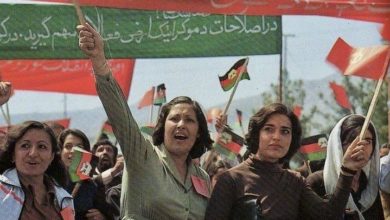“The airplanes came and were bombing until 3 am. And, in the morning, they started hitting our village with mortars and rockets. They didn’t allow anybody to come to our help.”
—Survivor of NATO bombing of Panjwai, Afghanistan
NATO’s ruthless bombing campaign against Afghan civilians has torn apart the last shreds of a mask of a “peacekeeping and reconstruction” operation. The Oct. 26 bombings, which killed uncounted scores of civilians, mark the five-year anniversary of the occupation of Afghanistan with the highest number of civilian deaths by multi-national forces since the October 2001 invasion. NATO’s turn to increasingly ruthless tactics are a result of the fact that anti-occupation sentiment is growing among people in Afghanistan, and the resistance movement is widespread among civilians. Clearly, NATO has failed to “win hearts and minds” of Afghan people. “Everyone is very angry at the government and the coalition. … These tragedies just keep continuing,” explained Abdul Aye, a Panjwai area villager.
NATO’s legacy of poverty
Although the shocking violence of these civilian bombings exposes the true face of the occupation, Afghans suffer from
 |
Losses in women’s rights
Of any group in Afghanistan, women bear the burden of some of the most devastating effects of poverty. In October 2001, the cover of every major news magazine was covered with pictures of Afghan women in burkas. The feature article inside was always a special on how the invasion of Afghanistan would rid people there of the Taliban and save lives of Afghan women. Fast forward to 2006. Afghanistan’s Gender Development Index is the third lowest in the world, at 0.3. Afghan women suffer immensely from the effects of poverty. Only 20 percent of Afghan women have ever seen a doctor. In part because of this, Afghanistan has the highest maternal mortality rate in the world, and most deaths are from preventable causes. Only 14 percent of Afghan women have experienced attendants with them during birth. In addition to this, the literacy rate for Afghan women hasn’t improved—it currently stands at 9 percent. For women in Afghanistan, the occupation has not been a liberating force—rather, it has been another burden laid on their shoulders, as they now have to struggle against the daily trials of poverty and violence in addition to their struggle as women.
Afghanistan’s economic crisis: The legacy of imperialism
“It would appear that Afghanistan is uniquely placed to seize upon the increasing affluence of its neighbours, however, amidst this rising tide of prosperity, Afghanistan lingers as a lone shipwreck, threatening to even reverse on a number of key poverty indicators which are nearly a generation behind those of its neighbouring countries.”
—Senlis Council Report
Afghanistan’s per capita gross domestic product (GDP) is about $200 USD. In contrast, surrounding countries have a per capita GDP of about ten times that, around $2,000 USD. Within this, the majority of the GDP comes from illegal opium production. As such, most of Afghanistan is run by warlords who operate the economy on a feudal system. Desperate farmers and peasants eke out their living by working under these warlords on these poppy plantations.
Afghanistan, despite being landlocked, is a country with immense value in its strategic location between trade markets of Asia, Europe, and the Middle East. Afghanistan should be a country at least as prosperous as others that surround it. Instead, Afghanistan’s long history of foreign occupation has left its economy and society both in pieces, and occupying countries like Canada continue to exploit the country and tear at the fabric of its’ society.
 |
Warlords and NATO guns: Democracy in Afghanistan
Afghanistan has been hailed as “the Middle East’s newest democracy.” But “democracy” on whose terms? The majority of people in Afghanistan don’t feel their government represents them, but rather, the interests of imperialist countries who occupy Afghanistan. The government does not administer essential services like health care or education—they are privatized services—so Afghans don’t see much material benefit from supporting one government or another. As well, the government holds only weak influence. Afghan president Hamid Karzai admits that his government’s power doesn’t extend beyond the carefully secured capital, Kabul. The rest of Afghanistan is left up to the reign of feudal warlords. Things don’t get much better in the Afghan parliament. Many members of parliament are themselves warlords or former warlords, being given financial support from the Canadian International Development Agency (CIDA) and others in the name of promoting “democracy.”
The government of Canada turns a blind eye to this, as the Afghan government works with the occupation forces. As former Afghan MP Omar Zakhilwal explained, “a top U.N. political advisor told me in no uncertain terms that the loya jirga [assembly] was not intended to bring about fundamental political change, such as ridding the government of warlords.” The handful of Afghan members of parliament who have voiced their opposition to the current government have noted that the loya jirgas called have simply been a method of officially rubber-stamping decisions about parliament and constitutional reforms pre-decided by the occupying countries. While the government of Afghanistan exists simply as a puppet for serving the interests of the countries occupying Afghanistan and the government warlords who support them, there is no democracy in Afghanistan for regular people.
Confronting Canada’s war drive
With each passing day, it becomes clearer that Canada’s mission in Afghanistan is an utter failure. The government of
|
Why, then, with their utter failure in Afghanistan, and rapidly falling support for the mission on the home front, does the government of Canada continue the mission in Afghanistan—and even talk about extending it beyond 2009? The reality is that the government of Canada is in a quagmire in Afghanistan. On one hand, they are fighting an un-winnable war against a growing resistance. On the other, they desperately need control of Afghanistan in a world where imperialist countries like Canada, the United States, and the UK are vying for their positions and strategic locations in the Middle East. Canada’s International Policy Statement, written in 2005, notes that Canada must break through the “glass ceiling of its middle power status,” and learn to compete “in a world of rising giants.” Afghanistan is a pivot point that is crucial transit hub between the markets of Europe, Asia, and the Middle East, and to control Afghanistan is to have major economic influence in these markets.
This economic interest that benefits the government of Canada, and the owners of Canada’s large companies and financial institutions, clearly doesn’t benefit people in Afghanistan who are living under military occupation. However, the majority of people in Canada also feel the effects of Canada’s war drive in Afghanistan. Recent examples include the new Conservative budget, in which $5 million was cut to the Status of Women in Canada program, while $2 billion was spent on military fighter jets. The anti-war movement in Canada, and working and oppressed people in Canada, have been silent on this for too long. It’s time to demand an end to Canada’s war drive in Afghanistan. As the government of Canada continues to push through critical decisions about extending the mission in Afghanistan and pouring money into the military budget, it’s time to demand an independent public inquiry into the war drive in Afghanistan. We need a chance to discuss and to debate the crisis in Afghanistan among regular people, not in parliament.
People in Afghanistan are fighting for an end to the Canadian and NATO war drive in their country because they know it is the only path to a better Afghanistan. As the government of Canada sinks deeper into its quagmire in Afghanistan, we poor, working, and oppressed people are obligated to support their call for self-determination.
Canada out of Afghanistan!
NATO out of Afghanistan!
Call for an independent public inquiry!
The writer is an antiwar and Cuba solidarity activist in Vancouver, British Columbia, Canada. She is the acting secretary of Mobilization Against War and Occupation (MAWO) and a regular contributor to the Fire This Time Newspaper.






